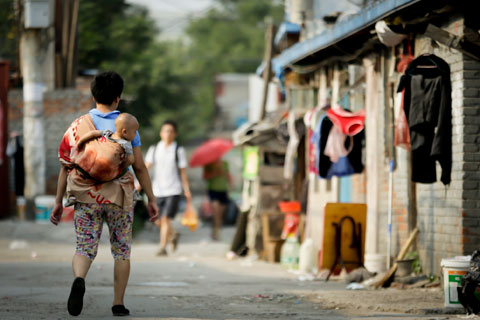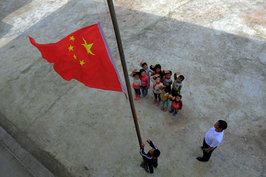Poor Parenting Hinders Development of China's Rural Children, Study Shows

(Beijing) — Children in rural areas of China suffer from slow cognitive development due to a lack of proper parenting and nutrition, casting a shadow over the future of the country's economy, a Stanford University study shows.
Scott Rozelle, co-director of the Stanford University Rural Education Action Program (REAP), told Caixin that more than half of the toddlers 24 to 30 months old and about 40% of the infants 6 to 18 months old scored below average in IQ tests. The average IQ score for these age groups should range between 90 to 109.
By monitoring the development of 2,500 children across Shaanxi, Hebei and Yunnan provinces in 2015, the REAP study found that the poor development of rural children was mostly due to poor parenting.
Only about 5% of parents in rural areas read books to their children, and 70% of families surveyed possessed only one book, or no books at all, the study showed.
"Chinese families love their children but don't know much about parenting," Rozelle said. "They think reading a book or singing to their babies is silly because they think 'They're just babies.' "
The study also showed that malnutrition also contributed to poor development.
The situation in rural areas could pose a major challenge for China as the country shifts its economy from traditional low-margin manufacturing to services and technology, Rozelle said. If learning difficulties cannot be overcome before a child reaches the age of 3 — a crucial window for child development — hundreds of millions of young people could be in danger of becoming permanently impaired physically and developmentally.
"Ultimately, if China becomes a high-wage, high-income society, a large share of these children will be unemployable," he said.
Malnutrition also contributes to slower intellectual development, the study showed. More than 70% of infants 6 to 18 months old in Yunnan have anemia — a lack of red cells that ferry oxygen around the body. The figure is about 60% in Hebei, and 50% in Shaanxi.
While nutritional supplements could help promote improved cognitive skills, the impact was seen to be relatively small and only aided infants 6 to 18 months old, the study showed.
Contact reporter Chen Na (nachen@caixin.com); editor Calum Gordon (calum@caixin.com)


- Sign In
- Cancel
- Remember me
- Forgot Password
- Don't have an account? Create one
- 1China Industrial Profits Drop as Demand From Overseas Stalls
- 2Cover Story: China’s Balancing Act to Keep Its Social Security System Afloat
- 3China’s Macro Leverage Ratio Rises to 294.8% Despite Slower Borrowing
- 4China’s Sovereign Fund Poured $45 Billion into Stock Market in First Quarter
- 5TikTok Shop Faces Regulatory Hurdles in Bid to Become No. 1 in Vietnam, Expert Says
- 1Power To The People: Pintec Serves A Booming Consumer Class
- 2Largest hotel group in Europe accepts UnionPay
- 3UnionPay mobile QuickPass debuts in Hong Kong
- 4UnionPay International launches premium catering privilege U Dining Collection
- 5UnionPay International’s U Plan has covered over 1600 stores overseas




